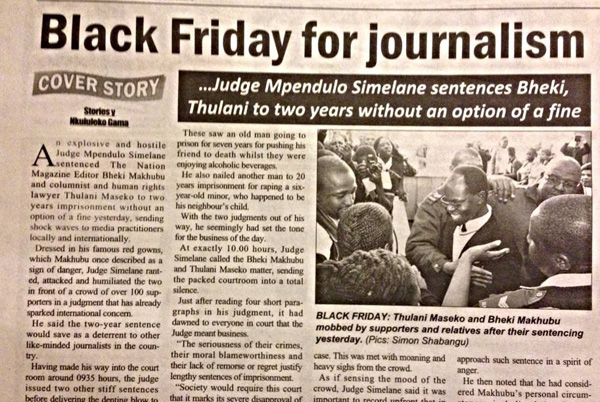Fascination About South African Current Events
Fascination About South African Current Events
Blog Article
South African Current Events Fundamentals Explained
Table of ContentsSouth African Current Events - QuestionsFacts About South African Current Events RevealedLittle Known Questions About South African Current Events.South African Current Events Fundamentals ExplainedNot known Facts About South African Current Events
The Limpopo Mirror is published in Louis Trichardt, a town in the north of South Africa's Limpopo district. Picture: Anton van Zyl This week the Competitors Payment is penetrating how online information is impacted by AI chatbots, search and marketing technology. The end result of the hearings is essential for the future of news coverage in South Africa.
Memberships and sales of specific copies were normally indicated to cover this, yet the real cash was advertising and marketing - and for some publications, like the Cape Argus in Cape Town, the classifieds. South African current events. The marketers funded the information, whether in a national everyday, or a little once a week paper distributed in a rural town
Arounds this revenue spent for the press reporter to attend the regular monthly council meeting, cover college occasions and see the court to discover that could have wound up on the incorrect side of the regulation. Consider instance the Limpopo Mirror, a weekly newspaper published in Louis Trichardt which one of us, Anton, owns.
We 'd normally market simply over 8,000 duplicates. The price of printing was roughly 15% to 20% of our turnover. That has gone up to 30% and 35%. The ad loading (the percentage of space devoted to advertising instead of news) was between 50% and 60%. South African current events. This has gone down to listed below 30% and some weeks we do not even reach 20%.
The Single Strategy To Use For South African Current Events
The decrease in advertising causes less web pages in the newspaper, and less room for information articles. As the web became significantly popular, newspapers began releasing their stories online, usually free. Limpopo Mirror was among the initial papers in the nation to release a website with once a week information updates.
In the starting the majority of us were driven by experimentation and the rush to be early adopters so we didn't lose out to the competition. But there was no practical company design. Adverts were uncommon and it took a while prior to this came to be the major method people read their news.
What Does South African Current Events Do?
It was practical, prompt and generally cost-free, particularly as the rate of data went down. At the exact same time, acquisitions of printed papers started to decline. A couple of instances: In 2006 the Sunday Times was the most significant weekend break paper in South Africa, with an audited flow of just over half a million duplicates.
Last year it dropped to listed below 13,000 sold copies and transformed its distribution technique. This has actually been the trend for a lot of long-running newspapers on the planet.
However the freesheet version does not work well in informal settlements or country locations. To effectively reach visitors in these locations, it's too costly to provide door-to-door. Bulk declines of newspapers have to be dropped off at buying centres, for instance, and wastefulness of these is high. This suggests you have to print larger quantities to reach the same Read Full Article number of people and this is not economically practical.
To generate a newspaper has come to be incredibly expensive, which suggests advertising and marketing tariffs have actually had to boost. To go was the classified sections of papers.
Our South African Current Events Diaries
While this was all happening, papers such as the Limpopo Mirror attempted to keep up. Print blood circulation dropped to around the 4,000 mark, the viewers did not move away.
The challenge was to transform that audience into an income version that would spend for high quality journalism. In South Africa, unlike a few other parts of the world, there is not read what he said a culture of paying for information. South African current events. Subscription versions provided some options in Europe, but right here it is presently not a viable alternative.
Furthermore social networks keeps journalists on their toes. There is no data to verify this, it appears to us that errors are detected much more quickly, and underhanded practices pounced on with higher vigour nowadays. The low expense of entry has actually additionally enabled new kinds of news magazines to start, like GroundUp, which Nathan edits.
3 Simple Techniques For South African Current Events
These would certainly have been a lot harder to run in the age of print. Yet they are all non-profit organisations, largely moneyed by huge institutional contributors. They do not have a peek at these guys depend upon offering their item to endure and the restriction to the number of such organisations can exist has possibly been gotten to. So why is advertising and marketing not helping information magazines? Advertising revenue has been destroyed mostly by Google Advertisements and social media adverts.
BNN is a news author. Their news tales constantly rank extremely on Google Information searches.
Days after Anton's story was published we both browsed "Vhembe" (the region where Anton reports from) on Google Information. Usually BNN news tales, plagiarised and apparently revised by ChatGPT or some other AI chatbot, appear greater in Google search than their real counterparts.
Two various Google products drive this fraud: Google Search drives readers to BNN; Google Ads offers the motivation for BNN's parasitic organization design. Up until now in 2024, 72% of GroundUp's traffic has actually come to our website by means of internet search engine. Google is liable for 99% of that. This is either straight using Google Search or via Google Discover that is installed on all Android phones.
Report this page